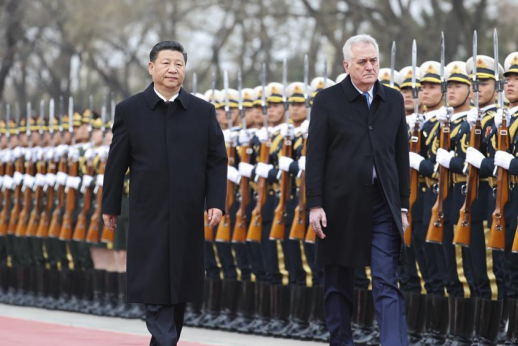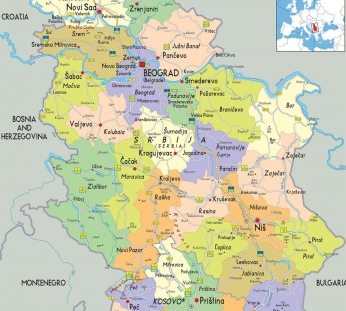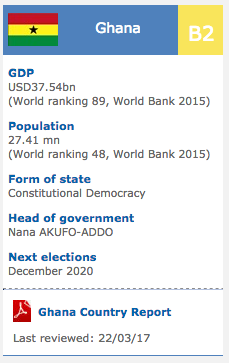
Serbia
Capital: Belgrade ; GDP growth (annual %) 2016 : 2.8%-
Hungarian Border ‘Smart Fence’ Violates Rights
Next Belgrade newspaper Politika reported on Tuesday that the Hungarian government is testing an electrified ‘smart fence’ on the border with Serbia, the Belgrade Centre for Protection and Help for Asylum-Seekers said the move was a violation of European human-rights agreements.
“Hungarian [border police] are beating migrants, attacking them with dogs, they are even beating children, and according to statements of migrants, they are periodically turning on the electricity in some parts of the [border] fence,” Rados Djurovic from the Centre told BIRN.
According to Politika, Hungarian officials insisted however that the voltage of the electricity is low, at 900 volts, so “it can’t seriously hurt people”.
More > -
SERBIA TAKES INITIATIVE TO FURTHER AMBITIONS
This is the sixth in a series of reports focusing on the development of the Belt and Road Initiative, China’s proposed extensive trading route linking Asia, Europe and Africa.
With a people of 7 million, roughly the same as a number of Chinese cities, Serbia will enjoy rapid economic increase, climbing from last year’s 2.8 % to 3.5 % in 2019, according to the World Bank.
The bank’s new updates suggest the Balkan country’s prospects are even rosier than those of the European Union economies, which will average about 2 % a year.
The promising outlook is half a result of the coun- try’s plan to become a regional transportation hub, which has seen Serbia deepen investment in roads, rails, the expansion of urban infrastructure and even construction of high-tech business parks — similar to the increase engines used in a number of cities in China.
More > -
China, Serbia vow to solidify friendship, cooperation
Chinese President Xi Jinping held talks with visiting Serbian President Tomislav Nikolic on Thursday, agreeing to enhance cooperation within the Belt and Road Initiative and the "16+1" cooperation mechanism.
The "16+1" refers to China and the 16 Central and Eastern European nations (CEEC).
The two leaders as well agreed to boost evolution of their comprehensive strategic partnership. Serbia was the initial CEE country to forge a strategic partnership with China
More >
- Key Facts
-
Full name: Republic of Serbia
Population: 9.9 million (UN, 2011, includes Kosovo; UN mission estimates Kosovo population as circa 2 million)
Area: 88,361 sq km (34,116 sq miles) (includes Kosovo)
Major language: Serbian
Major religion: Christianity
Life expectancy: 72 years (men), 77 years (women) (UN)
Monetary unit: Dinar = 100 paras
Main exports: Manufactured goods, food and live animals, machinery and transport equipment
GNI per capita: US $5,680 (World Bank, 2011)
Internet domain: .rs
International dialling code: +381
-

Climate change laws around the world
2017/05/14There has been a 20-fold increase in the number of global climate change laws since 1997, according to the most comprehensive database of relevant policy and legislation.
The database, produced by the Grantham Research Institute on Climate Change and the Environment and the Sabin Center on Climate Change Law, includes more than 1,200 relevant policies across 164 countries, which account for 95% of global greenhouse gas emissions.
-
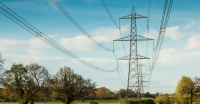
Brexit negotiations should treat energy as ‘special case’
2017/05/14There are strong practical reasons why the UK and EU should treat energy as a appropriate case during Brexit negotiations, argues a new statement.
The statement, jointly authored by Chatham Home, the University of Exeter and the UK Energy Research Centre (UKERC), says finding common ground on energy during the Brexit negotiations would benefit both the UK and remaining EU27, while compromise may be relatively easier to achieve than for other areas.
-
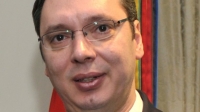
2016 Serbian General Election: Five Key Observations
2016/03/17Ahead of general elections in Serbia on Sunday 24th April, it is clear that current prime minister, Aleksandar Vučic, is king of all he surveys, that the Democratic Party has a bleak future, that the Kosovo issue is an afterthought and that the hard-right are likely to make a comeback. The question remains, however, as to whether or not Vučic is promising too much.
The Serbian general election has been announced for Sunday 24th April – the eleventh such contest to take place since 1990. Below, I offer five key observations about what the elections mean for Serbia itself, the ruling Progressive Party and its leader Aleksander Vučić, relations with Kosovo and the medium-term prospects for Serbian accession to the European Union.
- Serbia News
-
- PEOPLE: Hungarian Border ‘Smart Fence’ Violates Rights
- BUSINESS / TRADE: SERBIA TAKES INITIATIVE TO FURTHER AMBITIONS
- BUSINESS / TRADE: China, Serbia vow to solidify friendship, cooperation
- EDUCATION: Higher earning Why a university degree is worth more in some countries than others
- LOCAL GOVERNMENT: Serbian Opposition Seeks End to UAE Agreement
- ART / CULTURE: Belgrade's Artistic Salon Returns with Love Theme
- Trending Articles
-
- BOTSWANA: Bill Gates sees US likely to maintain aid levels for Africa
- NIGERIA: The city that won't stop growing, Lagos
- EUROPEAN UNION: UK seeks to 'align' with EU on data protection rules
- ANGOLA: Buhari Among African Presidents Who Lack Faith in Own Health Systems
- PAKISTAN: Qatar launches new direct sea route to Pakistan
- BOTSWANA: Africa’s economic growth in 2016 was driven by East Africa




